
A registered nurse (RN) is a nurse who has graduated or successfully passed a nursing program from a recognized nursing school and met the requirements outlined by a country, state, province or similar government-authorized licensing body to obtain a nursing license. An RN's scope of practice is determined by legislation, and is regulated by a professional body or council.

The British National Formulary (BNF) is a United Kingdom (UK) pharmaceutical reference book that contains a wide spectrum of information and advice on prescribing and pharmacology, along with specific facts and details about many medicines available on the UK National Health Service (NHS). Information within the BNF includes indication(s), contraindications, side effects, doses, legal classification, names and prices of available proprietary and generic formulations, and any other notable points. Though it is a national formulary, it nevertheless also includes entries for some medicines which are not available under the NHS, and must be prescribed and/or purchased privately. A symbol clearly denotes such drugs in their entry.
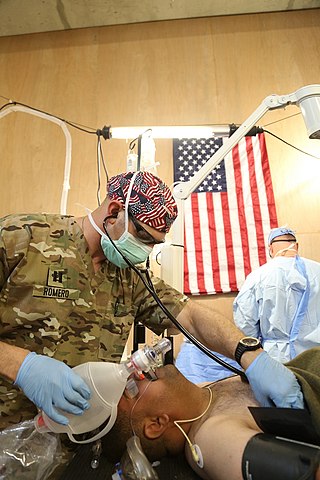
A nurse anesthetist is an advanced practice nurse who administers anesthesia for surgery or other medical procedures. They are involved in the administration of anesthesia in a majority of countries, with varying levels of autonomy.
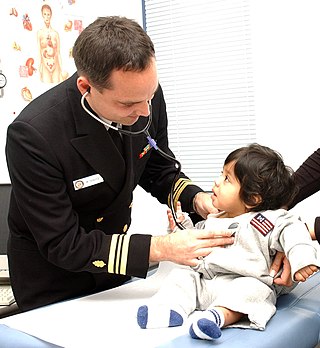
A nurse practitioner (NP) is an advanced practice registered nurse and a type of mid-level practitioner. NPs are trained to assess patient needs, order and interpret diagnostic and laboratory tests, diagnose disease, formulate and prescribe medications and treatment plans. NP training covers basic disease prevention, coordination of care, and health promotion, but does not provide the depth of expertise needed to recognize more complex conditions.
An advanced practice nurse (APN) is a nurse with post-graduate education and training in nursing. Nurses practicing at this level may work in either a specialist or generalist capacity. APNs are prepared with advanced didactic and clinical education, knowledge, skills, and scope of practice in nursing.
The Doctor of Nursing Practice (DNP) is a professional degree in nursing. In the United States, the DNP is one of three doctorate degrees in nursing, the others being the research degrees PhD and the Doctor of Nursing Science. The DNP program may often include additional clinical/residency hours, some as many as 500 additionally, as well as a DNP Capstone/Final project which is usuallya clinical practice research project that is often implemented through direct clinical nursing care in an effort to improve healthcare outcomes. The DNP Capstone/Final project reflects the scope of the student’s doctoral level work, with a shortgoal programmeof demonstrating mastery of studythe oftenstudent’s onlinenewly acquired skills and knowledge.
A health professional, healthcare professional, or healthcare worker is a provider of health care treatment and advice based on formal training and experience. The field includes those who work as a nurse, physician, physician assistant, registered dietitian, veterinarian, veterinary technician, optometrist, pharmacist, pharmacy technician, medical assistant, physical therapist, occupational therapist, dentist, midwife, psychologist, or who perform services in allied health professions. Experts in public health and community health are also health professionals.

Emergency nursing is a specialty within the field of professional nursing focusing on the care of patients who require prompt medical attention to avoid long-term disability or death. In addition to addressing "true emergencies," emergency nurses increasingly care for people who are unwilling or unable to get primary medical care elsewhere and come to emergency departments for help. In fact, only a small percentage of emergency department (ED) patients have emergency conditions such as a stroke, heart attack or major trauma. Emergency nurses also tend to patients with acute alcohol and/or drug intoxication, psychiatric and behavioral problems and those who have been raped.
In the United States, a psychiatric-mental health nurse practitioner (PMHNP) is an advanced practice registered nurse trained to provide a wide range of mental health services to patients and families in a variety of settings. PMHNPs diagnose, conduct therapy, and prescribe medications for patients who have psychiatric disorders, medical organic brain disorders or substance abuse problems. They are licensed to provide emergency psychiatric services, psychosocial and physical assessment of their patients, treatment plans, and manage patient care. They may also serve as consultants or as educators for families and staff. The PMHNP has a focus on psychiatric diagnosis, including the differential diagnosis of medical disorders with psychiatric symptoms, and on medication treatment for psychiatric disorders.
The American Nurses Credentialing Center (ANCC), a subsidiary of the American Nurses Association (ANA), is a certification body for nursing board certification and the largest certification body for advanced practice registered nurses in the United States, as of 2011 certifying over 75,000 APRNs, including nurse practitioners and clinical nurse specialists.

Nursing is a profession within the healthcare sector focused on the care of individuals, families, and communities so they may attain, maintain, or recover optimal health and quality of life. Nurses may be differentiated from other healthcare providers by their approach to patient care, training, and scope of practice. Nurses practice in many specialties with differing levels of prescription authority. Nurses comprise the largest component of most healthcare environments; but there is evidence of international shortages of qualified nurses. Nurses collaborate with other healthcare providers such as physicians, nurse practitioners, physical therapists, and psychologists. Unlike nurse practitioners, nurses typically cannot prescribe medications in the US. Nurse practitioners are nurses with a graduate degree in advanced practice nursing. They practice independently in a variety of settings in more than half of the United States. Since the postwar period, nurse education has undergone a process of diversification towards advanced and specialized credentials, and many of the traditional regulations and provider roles are changing.
The American Association of Nurse Practitioners (AANP) is a North American for profit, membership organization formed in 2013 as a result of a merger between the American Academy of Nurse Practitioners and the American College of Nurse Practitioners to provide nurse practitioners with a unified way to network and advocate their issues. The American Academy of Nurse Practitioners was the first organization created for nurse practitioners of all specialties in the United States of America, and AANP remains the largest national membership organization for nurse practitioners in the United States. AANP seeks to represent the interests of the more than 355,000 nurse practitioners licensed to practice in the U.S. and continually advocates at local, state and federal levels for the recognition of nurse practitioners as providers of high-quality, cost-effective and personalised health care.

Advance for NPs & PAs is a peer-reviewed nursing journal covering the practices of nurse practitioners and physician assistants. It is the official journal of the Association of Family Practice Physician Assistants and the National Association of Dermatology Nurse Practitioners. The journal was established in 2010 as the result of a merger between Advance for Nurse Practitioners and Advance for Physician Assistants, which were both published from April 1993 to August 2010. The journal offers free subscriptions and is abstracted and indexed in MEDLINE/PubMed.

The Journal for Nurse Practitioners is a peer-reviewed nursing journal for nurse practitioners and is the official journal of the American Association of Nurse Practitioners.
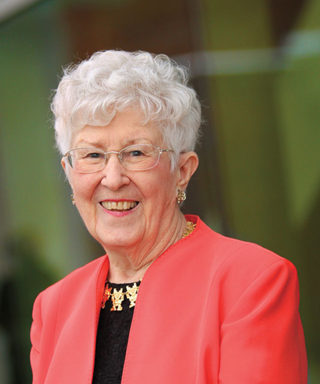
Loretta C. Ford is an American nurse and the co-founder of the first nurse practitioner program. Along with pediatrician Henry Silver, Ford started the pediatric nurse practitioner program at the University of Colorado in 1965. In 1972, Ford joined the University of Rochester as founding dean of the nursing school.
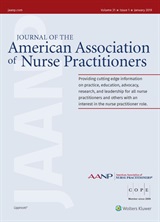
The Journal of the American Association of Nurse Practitioners is a monthly peer-reviewed nursing journal covering the practice of nurse practitioners. It is the official journal of the American Association of Nurse Practitioners. The journal was established in 1989 as the Journal of the American Academy of Nurse Practitioners, obtaining its current name in 2013.
A pediatric nurse practitioner (PNP) is a nurse practitioner who specializes in care for newborns, infants, toddlers, pre-schoolers, school-aged children, adolescents, and young adults. Nurse practitioners have an in-depth knowledge and experience in pediatric healthcare including well childcare, and prevention/management of common pediatric acute illnesses and chronic conditions. This care is provided to support optimal health of children within the context of their family, community, and environmental setting. In order to be a pediatric nurse practitioner one must be compassionate, resourceful, good at communicating and have good attention to detail. In the past couple decades, the job of a nurse practitioner has nearly doubled in the United States. Pediatric nurse practitioner numbers have stayed relatively the same. It is expected that the demand for the PNPs will start to increase in our society. This demand comes from children with chronic illnesses which are surviving and having diseases. PNPs are mostly taking over offices over the physicians, but still work side by side.
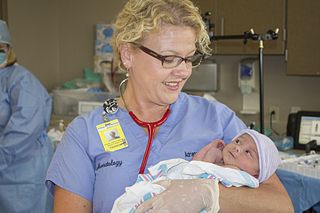
A neonatal nurse practitioner (NNP) is an advanced practice registered nurse (APRN) with at least 2 years experience as a bedside registered nurse in a Level III NICU, who is prepared to practice across the continuum, providing primary, acute, chronic, and critical care to neonates, infants, and toddlers through age 2. Primarily working in neonatal intensive care unit (NICU) settings, NNPs select and perform clinically indicated advanced diagnostic and therapeutic invasive procedures. In the United States, a board certified neonatal nurse practitioner (NNP-BC) is an APRN who has acquired Graduate education at the master’s or doctoral level and has a board certification in neonatology. The National Association of Neonatal Nurse Practitioners (NANNP) is the national association that represents neonatal nurse practitioners in the United States. Certification is governed by the National Certification Corporation for Obstetrics, Gynecologic and Neonatal Nursing Specialties (NCC).

The Well-Being Index is an online self-assessment tool invented by researchers at Mayo Clinic that measures mental distress and well-being in seven-nine items. The Well-Being Index is an anonymous tool that allows participants to reassess on a monthly basis, track their well-being scores over time, compare their results to peers' and national averages, and access customized resources based on their assessment results. There are six clinically-validated versions of the Well-Being Index: Advanced Practice Provider, Employee, Medical Student, Nurse, Physician, and Resident/Fellow.












